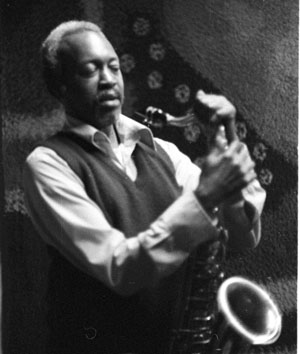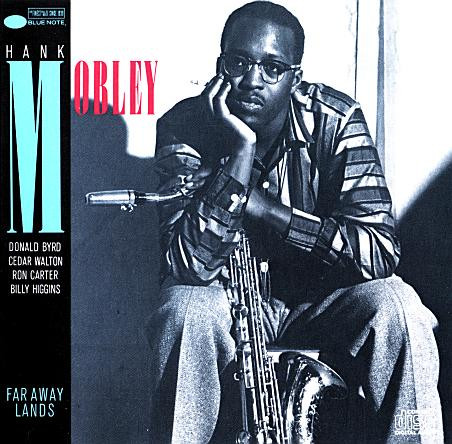No Argument – Hank Mobley
This minor-key medium-up swinger has a detailed rhythm section arrangement. A full set of quintet parts are available.
- Recording: Hank Mobley - Far Away Lands
- Recorded on: May 26, 1967
- Label: Blue Note (BST 84425)
- Concert Key: F minor
- Vocal Range: , to
- Style: Swing (medium up)
- Trumpet - Donald Byrd
- Tenor Sax - Hank Mobley
- Piano - Cedar Walton
- Bass - Ron Carter
- Drums - Billy Higgins
Video
- Description
- Historical Notes
- Solos
- Piano Corner
- Bass Corner
- Drum Corner
- Guitar Corner
- Inside & Beyond
- Minus You
An exciting minor-key medium-up swinger, in an angular hard-bop style. The A section melody is entirely in a pentatonic scale, which may suggest a modal harmonic structure, but the changes here are built on II-V7s. The bridge develops the second half of the A section melody over stepwise rising and falling triads. A pedal point interlude is used to launch the first soloist; it only happens once on the recording, but if you're playing this song you can use the interlude between solos as well.
The rhythm section arrangement is what really makes No Argument come to life. The first measure of the A section starts with only a drum hit on the downbeat; the melody, piano and bass come in (with the drums) on beat 3. In the bridge, the piano plays triads tied over from the "and" of 4 in each measure, while the bass holds down the root and fifth (double-stops) in repeated half notes right on beats 1 and 3. The pedal point interlude has a similar piano/bass interplay, with open fifths in the piano tied from the "and" of 4 over the bass pedaling quarter notes. Detailed piano, bass, and drum parts are available. The drum part includes some of Billy Higgins' fills from the recording, plus his pattern on the interlude.
Our lead sheets are also the first horn parts for the quintet arrangement. The horns play in octaves except on the last two measures of the bridge: the seventh measure is in contrary motion while the following phrase is voiced in tritones and fifths. The last note of the out head is also harmonized; this is shown with a smaller notehead in the second parts instead of making a first and second ending. The melody in the lower octave is a bit low in the alto sax's range; our alto second part is written in the same range as the first, indicated "optional 8vb."
The rhythm section arrangement is what really makes No Argument come to life. The first measure of the A section starts with only a drum hit on the downbeat; the melody, piano and bass come in (with the drums) on beat 3. In the bridge, the piano plays triads tied over from the "and" of 4 in each measure, while the bass holds down the root and fifth (double-stops) in repeated half notes right on beats 1 and 3. The pedal point interlude has a similar piano/bass interplay, with open fifths in the piano tied from the "and" of 4 over the bass pedaling quarter notes. Detailed piano, bass, and drum parts are available. The drum part includes some of Billy Higgins' fills from the recording, plus his pattern on the interlude.
Our lead sheets are also the first horn parts for the quintet arrangement. The horns play in octaves except on the last two measures of the bridge: the seventh measure is in contrary motion while the following phrase is voiced in tritones and fifths. The last note of the out head is also harmonized; this is shown with a smaller notehead in the second parts instead of making a first and second ending. The melody in the lower octave is a bit low in the alto sax's range; our alto second part is written in the same range as the first, indicated "optional 8vb."
"Far Away Lands" was Hank Mobley's last recording with Donald Byrd; they had played together on six previous sessions with Mobley as the leader as well as many with other leaders. This album also includes a version of Byrd's song Soul Time.
Earlier in May 1967, Ron Carter recorded on Miles Davis' "Sorcerer" album. A week before the "Far Away Lands" session, Ron also recorded for the first time with pianist Andrew Hill, on a trio session that was not released until 2005.
Earlier in May 1967, Ron Carter recorded on Miles Davis' "Sorcerer" album. A week before the "Far Away Lands" session, Ron also recorded for the first time with pianist Andrew Hill, on a trio session that was not released until 2005.
Related Songs
Email Send No Argument to a friend
Send this page to a friend via email. Add your name or email in the first field. In the second, add one or more email addresses, separated by a comma.

Hank Mobley
July 7, 1930 – May 30, 1986
Hank Mobley is one of the most acclaimed tenor saxophonists in modern jazz history. He is recognized by musicians and critics alike as one of the most important and eloquent jazz instrumentalists of all time. He recorded well over 100 of his own original compositions and left an indelible mark on the post-bop jazz scene. Read more...
There was a problem.
...

